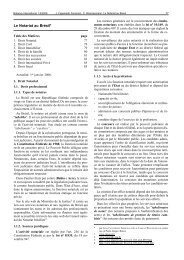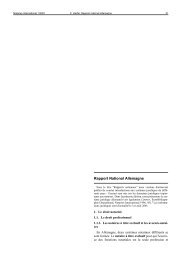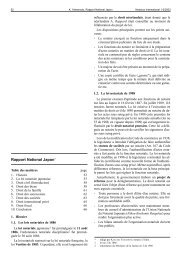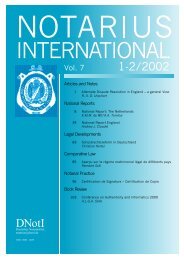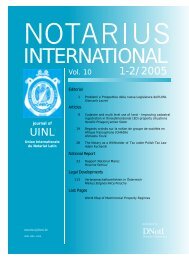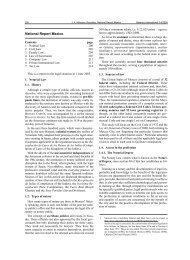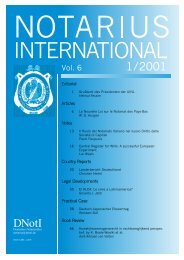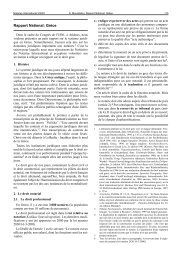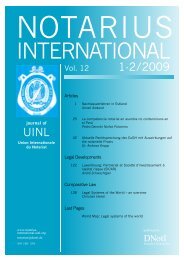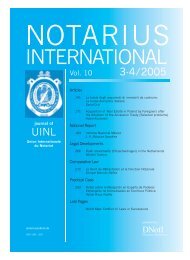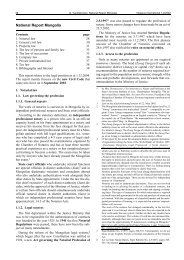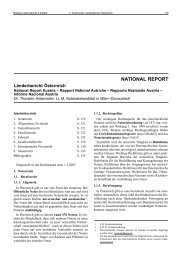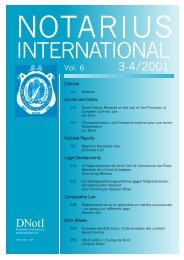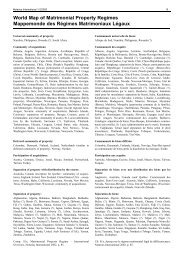ARTICLES and NOTES - Notarius International
ARTICLES and NOTES - Notarius International
ARTICLES and NOTES - Notarius International
Create successful ePaper yourself
Turn your PDF publications into a flip-book with our unique Google optimized e-Paper software.
<strong>Notarius</strong> <strong>International</strong> 3-4/2002 O. Soergel/O. Stöcker, EU Enlargement <strong>and</strong> Property Law 239<br />
touched in the event that there should be no effective causa.<br />
This principle can be found in § 873 (1), § 929 sentence<br />
(1) BGB. 5<br />
Diagram 4: Principles of Causality <strong>and</strong> Abstraction<br />
(Kausalitäts-/Abstraktionsprinzip)<br />
security <strong>and</strong> the contract creating the obligation to provide<br />
it; this relationship is determined through the principles of<br />
causality or abstraction (2.3. above). Accessoriness (Akzessorietät)<br />
on the other h<strong>and</strong> concerns the relationship of<br />
the security to the debt that it is securing <strong>and</strong> not to the contractual<br />
clause giving rise to the obligation to create it.<br />
Diagram 5: Causality <strong>and</strong> Accessoriness (Kausalität –<br />
Akzessorietät)<br />
The significance of the difference between the two solutions<br />
is seen with insolvency:<br />
In Example 1 if the transferee of the property becomes<br />
insolvent then – if there is no effective causa – according<br />
to the principle of causality the transferor can single out<br />
the property from the transferee’s estate because the lack<br />
of an effective causa means that title has not passed to the<br />
transferee <strong>and</strong> the property has not therefore fallen into<br />
his estate for distribution to his creditors. According to<br />
the principle of abstraction, in such a case the transferor<br />
with his claim for enrichment has a mere claim in the insolvency<br />
against the estate of the insolvent transferee that<br />
is available for distribution to creditors.<br />
Similarly in Example 2, if the holder of the security becomes<br />
insolvent, under the principle of causality the provider<br />
of the security has a claim against the insolvent estate<br />
for rectification of the property register if there was<br />
no effective creation of security in favour of the holder of<br />
the security because there was no effective causa. Once<br />
again the opposite is the case with the principle of abstraction:<br />
here, despite the lack of an effective causa, effective<br />
security is given to the lender with the creation<br />
<strong>and</strong> registration of the security. In such a case the provider<br />
of the security only has a claim for unjust enrichment<br />
against the holder of the security which, in the case of the<br />
latter’s insolvency, is merely a claim in the insolvency<br />
against the estate available for distribution.<br />
2.4. Accessoriness <strong>and</strong> Non-accessoriness<br />
Although structurally related to the twin concepts causality<br />
<strong>and</strong> abstraction (Kausalität – Abstraktion), the two<br />
concepts accessoriness (Akzessorietät – Nicht-Akzessorietät)<br />
have nothing to do with them.<br />
In the context of security interests, accessoriness (Akzessorietät)<br />
concerns the relationship between the security<br />
interest <strong>and</strong> the debt that it secures.<br />
This relationship – security interest/secured claim – has<br />
to be distinguished from the relationship between the security<br />
interest <strong>and</strong> its causa. The relationship security interest/causa<br />
is the relationship between the provision of the<br />
The security interest is accessory if by operation of law<br />
its existence depends on the existence of the debt to be<br />
secured (Best<strong>and</strong>sakzessorietät) or if by operation of law<br />
the creditor is only entitled to it if he is also the holder of<br />
the debt to be secured (Zuständigkeitsakzessorietät). Examples<br />
of such accessory security interests in German<br />
law are the surety contract (Bürgschaft), the lien (Pf<strong>and</strong>recht)<br />
over movables or receivables, the Auflassungsvormerkung<br />
(priority notice on the property register of a conveyance)<br />
<strong>and</strong> the Hypothek (mortgage).<br />
Diagram 6: Mortgage (Hypothek)<br />
The security interest is not accessory if by operation of<br />
law it neither depends on the existence of the debt to be secured<br />
nor dependents upon the fact that the holder of the<br />
security interest is also the creditor of the debt being secured.<br />
An example of such a non-accessory security interest<br />
under German law is the Grundschuld (l<strong>and</strong> charge).<br />
5 The legal consequence of the principle of abstraction (Abstraktionsprinzip)<br />
– effectiveness of the property law transaction despite ineffectiveness<br />
of the causa – does not however mean that the unjustified<br />
legal position of the transferor is definitive. The compensation between<br />
the two contract parties – transferor <strong>and</strong> transferee – results rather from<br />
the principles of the law on unjust enrichment. The transferor who has<br />
suffered the loss can basically dem<strong>and</strong> that the unjustly enriched transferee<br />
return the enrichment, can claim it back – (“kondizieren”).



